OpenFCST is an open-source fuel cell simulation software developed at the University of Alberta. The release version of OpenFCST (release v0.3) contains several steady-state cell-level and micro-scale simulation solvers. Cathode and anode electrode models, and several complete membrane electrode assembly models are available for macro-scale simulations (see tutorial page). For micro-scale simulations, an image to voxel-based mesh generator and a diffusion/conductivity solver are available. As of 2021, the OpenFCST team is working on release v1.0 which will include a pore-size distribution based two-phase flow model, a transient solver, and more advanced micro-scale simulation tools (see list of publications below).
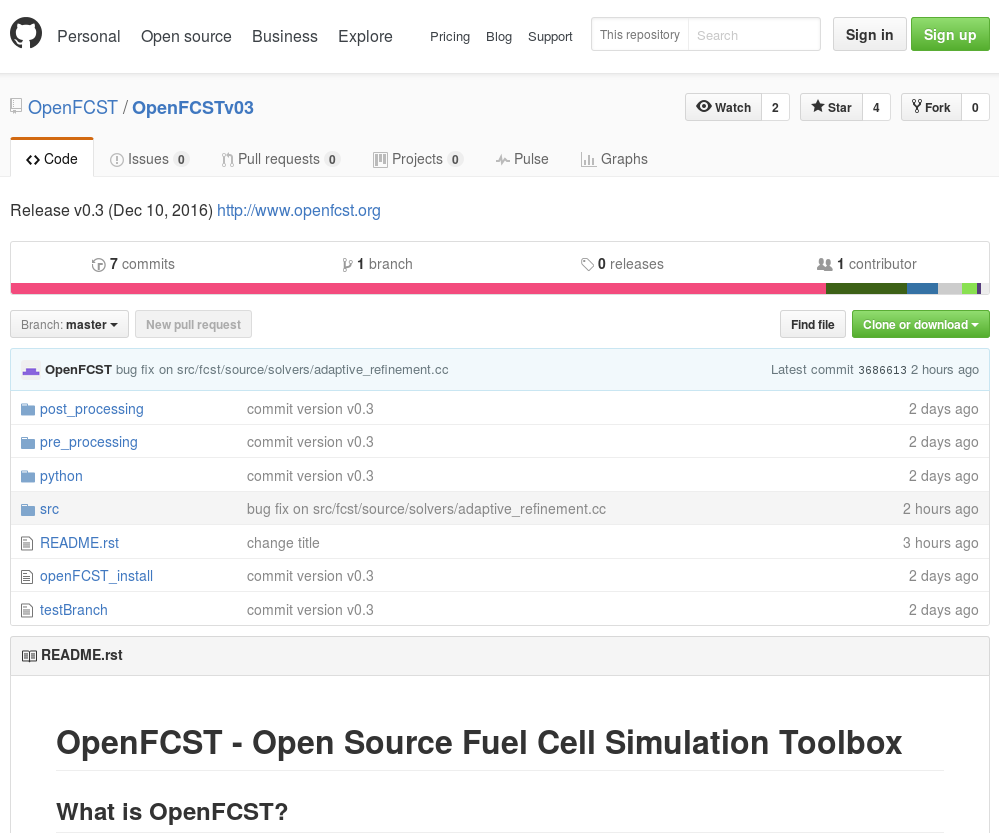 OpenFCST release 0.3 is now available in Github
OpenFCST release 0.3 is now available in Github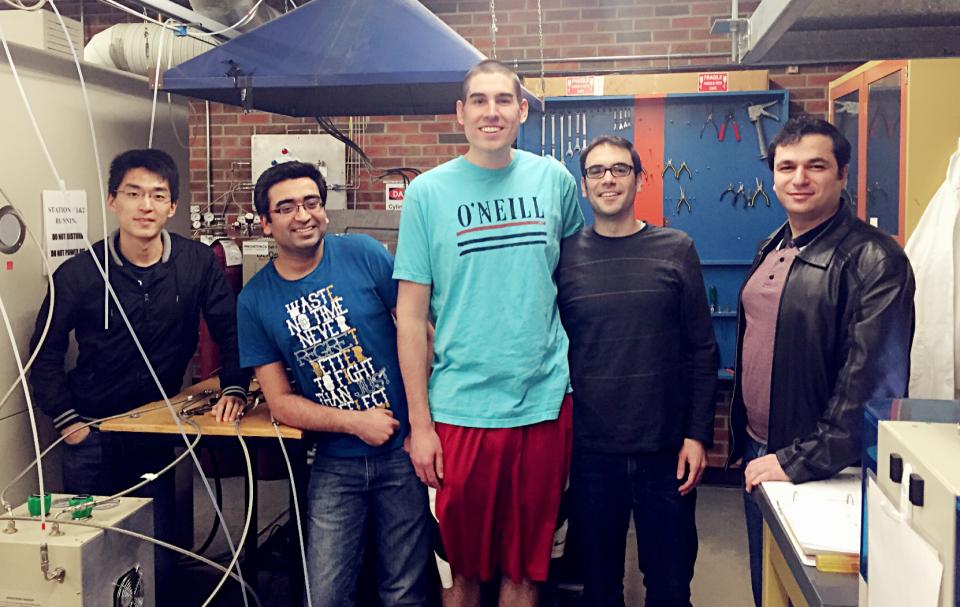 Developer team
Developer teamDeveloper team: M. Secanell, J. Zhou, A. Kosakian, M. Sabharwal, C. Balen.
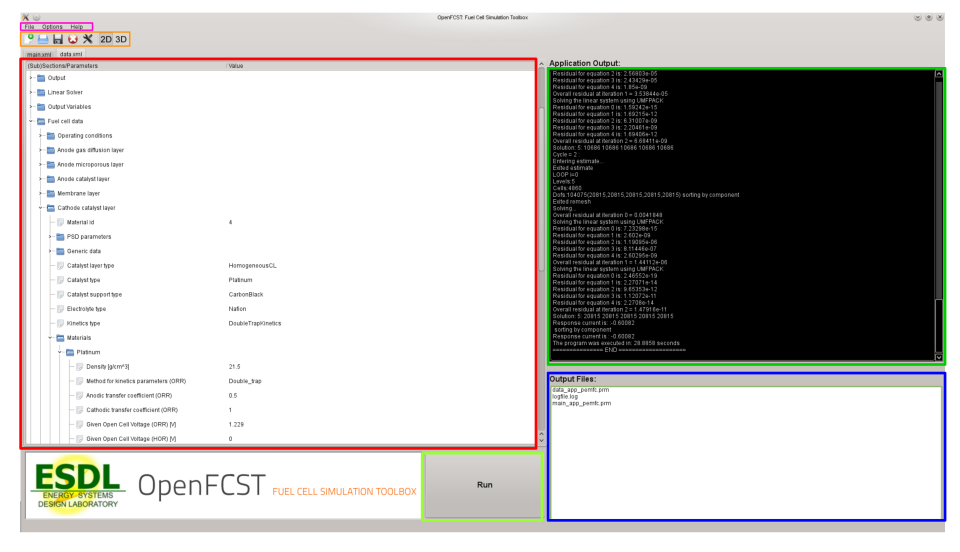 A graphical user interface allows user to interact with the code better
A graphical user interface allows user to interact with the code better
With the GUI, it is convenient to use OpenFCST ready-to-use fuel cell models as well as toolboxes for electrical, ionic, and gas transport models
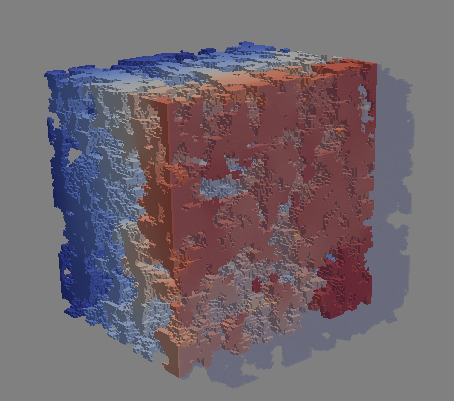 3D Reconstruction
3D Reconstruction
OpenFCST comes with a 3D reconstruction capturing the shape and appearance of the real porous media
Future release 1.0 highlights:
- A pore-size distribution based two-phase model
- Advanced micro-scale simulation tools
- Transient electrode and MEA models
- See list of publications page
Release 0.3 Highlights:
- New micro-scale simulation capabilities (gas and electron transport as well as reactions in ref. "Analysis of Catalyst Layer Microstructures: From Imaging to Performance, M. Sabharwal, L. M. Pant, A. Putz, D. Susac, J. Jankovic, M. Secanell, " Fuel Cells, 2016)
- A two-phase flow model (saturation based)
- Compatibility patches so that it works with the newest releases of Ubuntu and OpenSUSE
- New graphical user interface (GUI)
- Enjoy!
- Non-isothermal membrane electrode assembly model (see M. Bhaiya, A. Putz and M. Secanell, "Analysis of non-isothermal effects on polymer electrolyte fuel cell electrode assemblies", Electrochimica Acta, 147C:294-309, 2014. DOI: 10.1016/j.electacta.2014.09.051)
- Double-trap kinetic model available (see M. Moore, A. Putz and M. Secanell, "Investigation of the ORR Using the Double-Trap Intrinsic Kinetic Model", Journal of the Electrochemical Society 160(6): F670-F681. doi: 10.1149/2.123306jes)
- Multi-scale framework for analysis of complex agglomerate structures available (see M. Moore, P. Wardlaw, P. Dobson, J.J. Boisvert, A. Putz, R.J. Spiteri, M. Secanell, "Understanding the Effect of Kinetic and Mass Transport Processes in Cathode Agglomerates", Journal of The Electrochemical Society, 161(8):E3125-E3137 DOI: 10.1149/2.010408jes)
- Improved compilation script and transition to CMake: OpenFCST will automatically look for all dependent libraries and will automatically download any missing libraries if necessary. (Installation tested nightly in OpenSUSE 12.3 and Ubuntu 14.04)
- Improved documentation: Improved user guide and folder with input files for several of the articles above.
- Improved post-processing capabilities: New classes developed to be able to output oxide coverage, agglomerate effectiveness, relative humidity, overpotentials and more.
- Improved post-processing capabilities: New classes to compute functionals such as overall current density and all types of heat losses.
About:
The Fuel Cell Simulation Toolbox (OpenFCST) is an open-source mathematical modelling package for polymer electrolyte fuel cells. OpenFCST builds on top of the open-source finite element libraries deal.II, therefore many of its requirements in terms of operating systems and such are the same as for deal.II. OpenFCST is distributed under the MIT License. OpenFCST has been developed as a modular toolbox from which you can develop your own applications. It contains a database of physical phenomena equations, fuel cell layers and materials, and kinetics mathematical models. In addition, it already contains several applications that allow you to simulate different fuel cell components. For example, you can simulate a cathode electrode (using either a macrohomogeneous or an ionomer-filled agglomerate model), an anode electrode or a complete membrane electrode assembly. The applications already provided in OpenFCST have been validated with respect to experimental data in the literature as well as numerical results from another model implemented in a commercial package. OpenFCST is being developed at the Energy Systems Design Laboratory at the University of Alberta in collaboration with the Automotive Fuel Cell Cooperation Corp. that, together with the Natural Science and Engineering Research Council of Canada has provided the majority of the funding required to develope this code. The goal of OpenFCST is that research groups in academia and in industry use the current toolbox to better understand fuel cells and to develop new physics and material databases that can then be integrated in the current library. OpenFCST is an integrated open-source tool for fuel cell analysis and design. It has been developed primarly using the deal.II finite element libraries. It seamlessly integrates several open-source pre-processing, finite element and post-processing tools in order to analyze fuel cell systems. OpenFCST contains a build-in mesh generator as well as it can import quadrilateral meshes generated with the open-source pre-processor Salome if your problem requires to simulate more complex geometries. The physics and material database in OpenFCST allow you to setup the governing equations for the most important physical processes that take place in a fuel cell. OpenFCST already implements the weak form for many governing equations that are finally solved using the finite element open-source libraries deal.II. In order to analyze your results, OpenFCST can output your results to .vtk files that can easily be read with the open-source post-processor Paraview. OpenFCST is not only an analysis tool. OpenFCST also is also integrated with the design and optimization package Dakota. Therefore, it can be used for design and optimization as well as parameter estimation. The following publications are based on OpenFCST and provide information about the code:
- M. Secanell, A. Putz, P. Wardlaw, V. Zingan, M. Bhaiya, M. Moore, J. Zhou, C. Balen and K. Domican, "OpenFCST: An Open-Source Mathematical Modelling Software for Polymer Electrolyte Fuel Cells", ECS Transactions 64(3): 655-680, 2014. doi:10.1149/06403.0655ecst.
- OpenFCST development team. Fuel Cell Simulation Toolbox (OpenFCST): User and Developer's Reference Guide.
News
- Join Google Groupfor user's discussion forum.
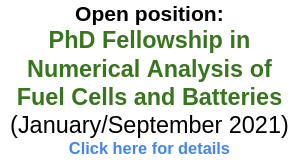
 Johnson Matthey
Johnson Matthey Automotive Fuel Cell Cooperation Corp.
Automotive Fuel Cell Cooperation Corp. Natural Science and Engineering Research Council of Canada
Natural Science and Engineering Research Council of Canada Catalysis Research for Polymer Electrolyte Fuel Cells
Catalysis Research for Polymer Electrolyte Fuel Cells